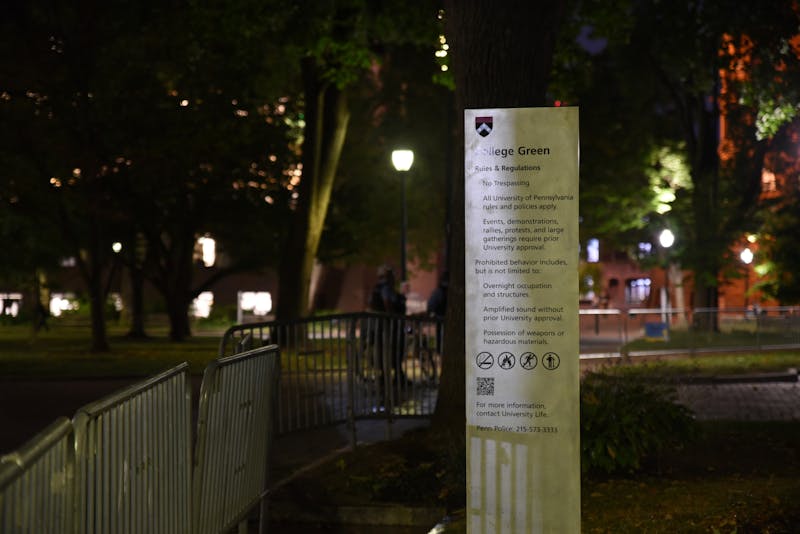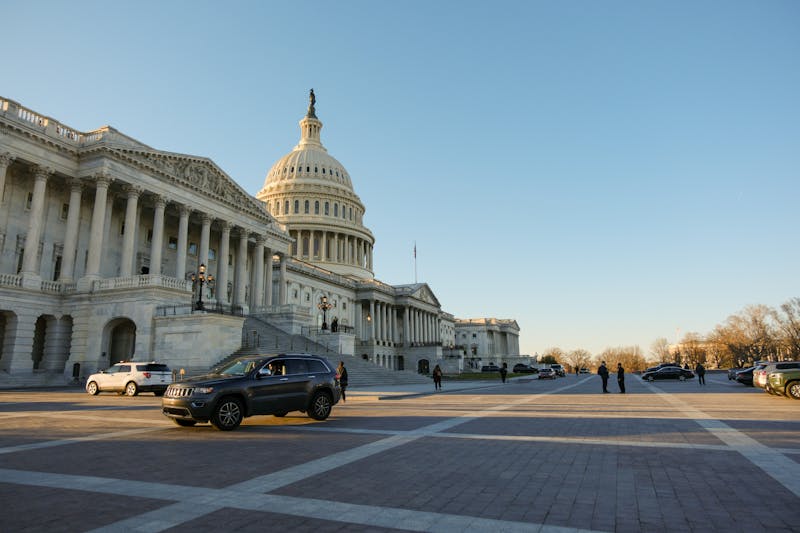
1968 Wharton graduate, former President, and President-elect Donald Trump went into Election Day with a clear roadmap for his second term — including for higher education institutions like Penn.
That plan became a real possibility as votes trickled in on Tuesday evening and several media networks called the race for Trump over Vice President Kamala Harris early on Wednesday morning. The Daily Pennsylvanian took a look at what a second Trump presidency — and a projected Republican majority in the Senate — could mean for Penn and higher education institutions across the country.
At a December 2023 rally in New Hampshire — held a week after former Penn President Liz Magill's resignation under significant political pressure — Trump referenced several institutions of higher education that had come under congressional scrutiny, including Penn, Harvard University, and the Massachusetts Institute of Technology. He said at the rally he would “take away their tax advantages and grants” if they “attack free speech.”
“We're going to take away their endowments, and they will pay us billions and billions of dollars for the terror they have unleashed into our once-great country,” Trump said, later telling the crowd that he would “stand up to the radical left communists, Marxists, fascists, and frauds who have taken over our universities.”
The Republican National Committee Platform Committee adopted a resolution in the GOP’s platform in July addressing recent campus protests. One of 20 "promises" contained in the platform advocated for the deportation of “pro-Hamas radicals” to “make our college campuses safe and patriotic again.”
During the 2023-24 academic year, Penn was the site of many instances of pro-Palestinian protests — including surrounding the Palestine Writes Literature Festival in September 2023, in the aftermath of the Oct. 7, 2023 Hamas attacks on Israel, and during the Gaza Solidarity Encampment in the spring semester.
Project 2025 — The Heritage Foundation's 900-page manifesto for a future conservative presidency — contains a robust section on higher education reform. The document includes proposals to restrict federal funding to higher education institutions, pause loan forgiveness programs, and restructure university-level pedagogy.
It remains unclear what action Trump or a Republican-controlled Congress would take to restrict federal funding from universities like Penn, or through what channels. While Trump has attempted to publicly distance himself from Project 2025, his campaign and allies have many connections to The Heritage Foundation and the initiative, with nearly half of the document's authors and editors having served in Trump's first administration.
Project 2025 accuses President Joe Biden and former President Barack Obama's administrations of transforming the Department of Education into a “politically motivated” agency whose processes “have done nothing to dampen the illiberal chill that has swept across American campuses over the past decade.” The plan, in response, proposes eliminating the DOE altogether.
The plan also advocates for states to hold more control over accreditation processes to prevent agencies from mandating diversity, equity, and inclusion policies that may conflict with institutional missions, especially for faith-based schools, and to prevent federal agencies from “intruding on the governance” of such institutions.
It also calls on the next president to issue a series of executive orders curtailing DEI and critical race theory programming — potentially impacting academic research on such subjects and cultural resource centers at Penn.
These would require "A report on the negative influence of action civics on students’ understanding of history and civics and their disposition toward the United States” and “An accounting of how federal programs/grants spread DEI/CRT/gender ideology,” among other executive orders.
Project 2025 also prescribes the privatization of “all lending programs” to “end the current Administration’s abuse” of the DOE’s loan forgiveness programs — a proposal which would have a significant potential impact on students at Penn who take on loans to cover the cost of attendance. According to the proposal, this would “allow for market prices” to control educational expense structures.
The undergraduate cost of attendance for the 2024-25 academic year at Penn exceeds $90,000 — totaling more than $360,000 over four years.
The plan also places a focus on curbing foreign influence in higher education, particularly from China. According to the proposal, “more than 100 universities” received donations derived “from the Chinese Communist Party and its proxies,” and suggests curbing foreign contributions exceeding $250,000 and tying federal funding to foreign contribution reporting requirements.
Congressional Republicans have leveled significant criticism at the Penn Biden Center for Diplomacy and Global Engagement over allegations of foreign influence and donations from China since 2021.
A Trump presidency, Republican control over the Senate, and potentially control of the House, would involve an increased likelihood of increased congressional investigations into universities like Penn over allegations of antisemitism.
In May, House Speaker Mike Johnson (R-La.) announced a House-wide investigation into antisemitism on college campuses involving six U.S. House committees. The investigation expanded ongoing probes into universities’ responses to campus antisemitism, including two committees' previous investigations into Penn.
On Oct. 31, the House Committee on Education and the Workforce — one of the committees which originally investigated Penn — released a report characterizing the findings of its investigations, including Penn's disciplinary data and internal correspondence between administrators.
Trump could also try to mobilize federal resources to fight what he calls “out of control” crime in cities like Philadelphia across the country — a frequent talking point of the former president at rallies throughout his campaign.
During a June rally in Philadelphia, Trump blamed Biden for causing rates of crime that are “out of control,” claiming that the city was “ravaged by bloodshed and crime.” Trump alleged that gun violence has surged, murder rates are the highest in decades, and retail theft is up more than 100%.
“But saving this once-incredible place begins with stopping the killing and the crime that is setting records every single week,” Trump said.
Project 2025 also calls for the importance of addressing crime and the need for strengthened efforts to combat it effectively.
“The department’s leadership must make actually reducing violent crime a priority across the United States—and it must do so in partnership with state and local officials in a manner that is tailored to the needs and conditions in those states and localities,” the plan reads.
The Daily Pennsylvanian is an independent, student-run newspaper. Please consider making a donation to support the coverage that shapes the University. Your generosity ensures a future of strong journalism at Penn.
Donate












